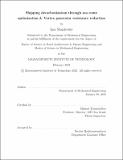Shipping decarbonization through sea route optimization & Vortex generator resistance reduction
Author(s)
Mogilevsky, Igor
DownloadThesis PDF (7.962Mb)
Advisor
Triantafyllou, Michael
Terms of use
Metadata
Show full item recordAbstract
The IMO has set a target goal to reduce 40% of greenhouse gas (GHG) emissions by 2030, with the aim of pursuing efforts towards 70% reduction by 2050. In order to achieve this goal, accurate prediction of ship resistance and identification of effective resistance reduction measures are crucial. This thesis presents a ship resistance evaluation model that aims to accurately predict the added resistance experienced by a ship in high seas based on its physical characteristics and operating conditions. The model is developed as part of the ship decarbonization movement with the goal of helping to optimize ship performance and reduce fuel consumption.
The model is developed using a combination of experimental data and computational evaluations. The performance of the model is validated against sea trial measurements. The results show that the proposed model is able to accurately predict ship resistance for a wide range of vessel types and operating conditions, and estimate the added resistance based on a reliable sea state database (ERA5 from ECMWF). The model is applied to evaluate the added resistance for a cross-pacific route, providing valuable insights for ship operators working towards the goal of reducing GHG emissions by 70% by 2050.
In addition to the model development, this thesis also discusses and tests the use of Vortex generators (VGs) as an innovative tool for ship resistance reduction. The theory shows that the use of VGs is an effective method for potentially reducing ship’s form factor resistance, with an expected reduction of up to 30% of total resistance.
While the research shows that the use of vortex generators can be an effective method for reducing ship resistance, further research is needed to optimize the size, shape, and position of these generators in order to maximize their effectiveness. Overall, the model and the use of Vortex generators are expected to be valuable tools for ship designers, operators, and researchers working towards the decarbonization of the shipping industry.
Date issued
2023-02Department
Massachusetts Institute of Technology. Department of Mechanical EngineeringPublisher
Massachusetts Institute of Technology